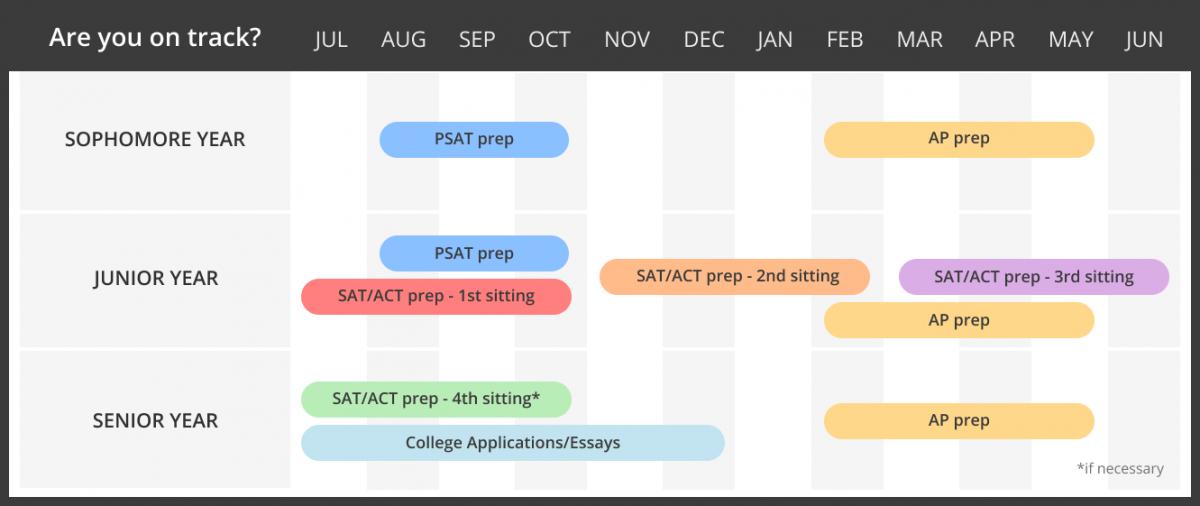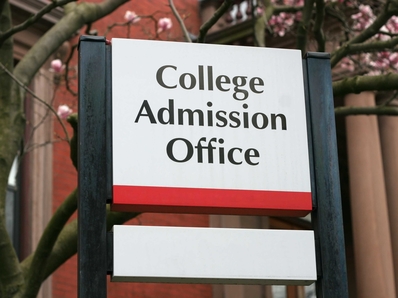

Whether you’re an incoming freshman unsure of which high school classes to take or a senior navigating the seemingly countless college application essays, the process can be overwhelming. You repeatedly find yourself questioning which you want more: acceptance to a top university or some semblance of a childhood. Good college planning begins with good high school planning. Are you taking the right classes? Are you involved in enough extracurriculars? Great Expectations counselors encourage students to find academic and extracurricular pursuits that they both enjoy and excel at so that the hours invested feel more like play than work but are still productive. At the end of the day, colleges want strong students, but they also want real people with real commitment to their interests — our goal is to help you create a narrative that is both authentic AND unique.
Seniors, we know that you’re on overload by Day One. It’s enough of a challenge to get all of the necessary tests taken, recommendations submitted, essays written, interviews completed, and applications filled out and submitted by their respective deadlines — it’s quite another to do them all well. Students and parents alike can benefit from expert guidance at every hairpin turn, helping to keep them on track and on time.

While our number one priority is helping students put together applications that have the best chance of acceptance at the best schools, we also understand how important it is to keep tension between parents and kids low during this stressful time, and we consider it part of our responsibility to do exactly that. And we promise: the sooner you start, the less stressful the process will be!
If you’re unsure what you should be considering or doing at various points throughout high school, visit our detailed high school timeline to make sure nothing is falling through the cracks.
Explore our various Classic packages, Classic+ packages, and Founder’s Circle packages to determine which is best for you!
FAQs
- When should I start college planning?
-
It depends on how much personalized guidance you are getting at your school. A lot of clients start meeting with us as early as eighth grade and set a session every six months or so, just to discuss class options, extracurricular opportunities, et cetera.
If you want to be an engineer, do you know which classes most college programs require? Are you familiar with the testing and academic course requirements at your dream schools? Is it okay to drop foreign languages or sciences after three years? Do you know how to assess undergraduate programs differently based on whether or not you intend to attend graduate school? Are you visiting enough colleges campuses to explore your options and determine what you really want?
If not, it would be wise to set an initial meeting as early as possible…it’s never too soon to understand what path you need to be on to achieve your goals. However, if you feel your school counselor is answering your questions, you can wait until the summer before senior year, at which point you should start digging into essays and applications.
- What sort of help will I need during the college application process?
-
Simply figuring out where to apply can be an overwhelming venture. After helping you settle on a list of schools and discussing the merits of early vs. regular decision, we will start outlining/writing essays and creating timelines/deadlines to keep you on track throughout the process.
- How will my counselor know who I am or what I want out of college?
-
First, we ask every new client to fill out a brief survey about their personality, interests, goals, et cetera and try to pair students with counselors who will be the best fit.
Second, our College Counselors have been selected and trained specifically to work with students moving into higher education; we are trained to not only help you apply to schools, but also to help you find those schools in the first place! We listen to you to discover your interests, curiosities, and preferences so that the colleges you apply to are great fits — not just a slapped together list of recognizable schools. There are over 2800 four-year colleges in the United States alone, so it actually makes our job a lot easier if we get to know you! Our College Counselors hail from all areas of the country and have in-depth knowledge of the college landscape, both in the U.S. and internationally. Whether it’s a school in the UC system or a small college in Iowa, we will provide you with valuable insights and guidance throughout your college selection process, helping you differentiate between what you truly want (or don’t want) and what is simply the fear of the unknown.
- I have no idea what to write my essays about. There’s nothing unique about me.
-
There is something unique about everyone! Our College Counselors will help you unlock your powerful story and help you showcase your talents and special qualities to admissions officers. You don’t have to cure cancer to catch a college’s attention…you need to know who you are, who you want to be, and show a commitment to becoming the best version of yourself.
- I’m a good writer. Why do I need help with my application essays?
-
Ask any professional writer out there if he or she has published a work without an additional pair of eyes — or ten! A good writer knows that a great piece of writing comes from honing and editing initial drafts with a fresh perspective, which is nearly impossible to achieve on your own when you’re writing autobiographically.
Additionally, just because you’re a good writer doesn’t mean that you necessarily know what college admissions officers are looking for. A personal statement should be an unusual combination of short story and academic essay — a hybrid most students have little experience with. We are also familiar with what topics are overdone and cliched, as well as which ones should never be written in the first place.
Our College Counselors are trained to make students’ essays the most polished, honest, unique, and interesting essays that each student is capable of. We work to identify exactly what the student is trying to say and then ensure that the essay conveys that message. An outstanding essay is concise, specific, thoughtful, compelling, and unique — and that’s not even considering grammar and structure! Writers of all backgrounds will receive expert guidance and feedback, and find their essays improved without sacrificing their voice or intent.
- I’m a senior and it’s Thanksgiving. Is it too late to start?
-
No. Our college counselors are trained to work with students at any stage of the application process, including on a deadline. However, the later you start, the less extensive aid we’ll be able to provide, so it’s to everyone’s benefit to get started earlier if possible.
- Is Community College the best route for me to get into a UC school?
-
The most simple, honest answer is “perhaps.” There are a lot of pros and cons to consider both routes (direct and indirect), and we will help you evaluate all options and devise a thoughtful short-term and long-term game plan to help you reach your ultimate goal.
- I think I may want to take a gap year, but should I still apply for college this year?
-
While a gap year (a year break) may be a wise option for some — whether for personal reasons or simply to make extra time to take courses to strengthen an academic profile — we encourage students to apply directly to colleges, regardless. You can always go through the application process and then decide to take a gap year, as you may miss a lot of opportunities you didn’t know existed if you jump straight into a gap year without considering the collegiate alternatives. There are a lot of wonderful college options out there, and we are here to help you every step of the way.
- How many schools should I apply to?
-
The answer to this question is a little different for each student, but we generally recommend using the 1-2-1 approach — in other words, applying to roughly 1 safety, 2 targets, and 1 reach for every 4 schools you apply to.
We can help you identify which schools fit into these categories, given your specific experiences and academic credentials, and we can help make sure that you are applying to enough schools that you will have a variety of choices, but not so many that you will have to sacrifice the quality of your work on the applications that you should be prioritizing. In our experience, 8-12 schools in total is ideal, as it gives you quite a few options but still allows you to put a lot of effort into each application. There are, of course, students who apply to far more or far fewer schools than that — it’s entirely up to you to determine how much time and energy you’re willing to put into the process.
- My high school already has a college counselor, an essay bootcamp, and/or other college informational activities. Won’t I get most of my questions answered at school?
-
Your school counselor and school activities are a great place to start, but you have to share your counselor’s time, or share the floor at college information nights, with dozens (if not hundreds) of other students. We have much more time to focus on YOU! We can be as involved as you’d like — reading every essay, reviewing every application, confirming colleges’ receipt of every official document you’ve sent, etc.
- How many sessions will I need?
-
The answer to this, of course, depends entirely on what you hope to accomplish and in which area you are seeking guidance. Do you simply want help polishing essays, or are you looking for guidance in selecting schools, navigating various requirements and deadlines, prepping for interviews, et cetera? Note that some colleges require NO essays, whereas other schools require more than ten — so, simply put, the biggest variable in this equation is WHICH SCHOOLS you are applying to. Once that is determined and you have a sense of what parts of the process you feel in control of and which you don’t, we can help you come up with a game plan to tackle the massive to-do list in the most organized way possible.
- What are the major ways that the college admissions process has changed because of COVID-19?
-
It is more difficult for students to differentiate themselves than ever before. Without test scores, extracurricular accomplishments, or summer activities -- and with a large portion of grades based on unreliable and uneven online learning -- Admissions officers can’t turn to their normal factors to compare students. College essays will be more important than ever before for students to paint a picture of who they are and what they can offer.
- Should I write an essay about how the pandemic affected me? Why/why not?
-
As a general rule, only write about the pandemic if your experiences were more extreme than those of your peers -- for instance; if a parent lost a job because of COVID-19, which required you to move or switch schools, that is a disruption worth noting. However, if you would simply talk about learning to appreciate the little things, missing your activities and face-to-face interactions, or what you did to keep busy, it’s best to avoid this topic.
